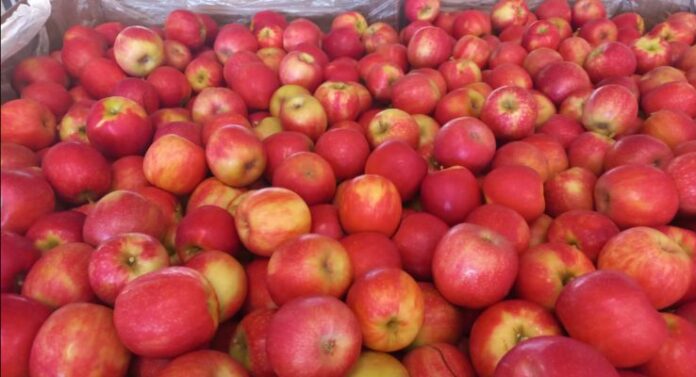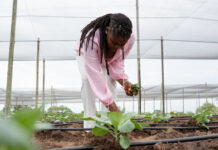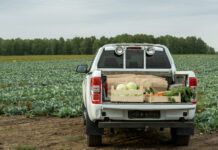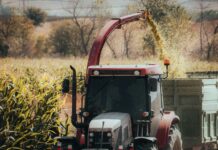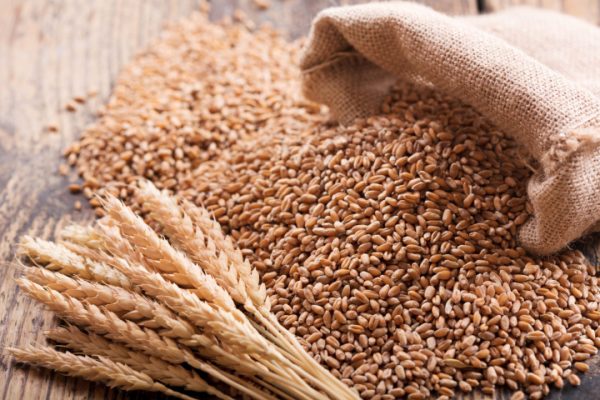Through years of targeted investment, shared learning, and precision orchard management, Tru-Cape growers have positioned themselves to unlock the full potential of Pink Lady® apples—and the results are now evident in their packhouses, with the highest Pink Lady® packouts in their history.
Both Tru-Cape packhouses made significant strides this season. At Ceres Fruit Growers, Pink Lady® packouts reached nearly 75%—the highest on record for the business. At the same time, Two-a-Day saw an impressive 8 percentage point increase in Pink Lady® packouts compared to last year. This success is the result of a coordinated, long-term strategy by Tru-Cape growers to enhance colour development, fruit quality, and yield consistency.
A key turning point came with the realisation that increasing the proportion of Pink Lady® (versus Cripps Pink) apples packed could significantly boost profitability.
“We made it our goal to get closer to 80% Pink Lady® per hectare, and we’ve come a long way. These results show that the strategy is working,” says Calla du Toit, Tru-Cape’s Procurement Manager.
Innovation Begins in the Orchard
Growers like Kootjie Viljoen, from the farm Oewerzicht near Greyton, have led the charge by adopting a holistic set of techniques aimed at improving light penetration and enhancing colour—especially in warmer regions where this can be a challenge.
“We do summer pruning, break leaves around the fruit, and use reflective mulch under the trees,” says Viljoen. “The mulch, which we developed in collaboration with Polywrap, reflects sunlight back into the canopy, giving the fruit more light from all angles. This results in a higher percentage of well-coloured apples. These efforts have increased our Pink Lady® yield by around 20%.”
While the practices come at additional costs, they add tens of thousands of rands in value per hectare.
Harnessing Natural Advantage and Smart Orchard Systems
In cooler regions like the Witzenberg Valley, producers such as Du Toit use automated overhead irrigation to manipulate the diurnal temperature during the ripening phase, further enhancing colour, without compromising fruit quality.
“When the temperature drops below a certain threshold, irrigation kicks in automatically—similar to frost protection, but triggered at a higher temperature. This lowers the orchard’s ambient temperature further, increasing the difference between day and night temperatures, which improves colour development,” he explains.
Another widely adopted technique among Tru-Cape growers is the use of nets, which filter sunlight to reduce sunburn while promoting more even and consistent colouring.
At Laastedrif, Rossouw Cillié is combining his natural climate advantage with fine-tuned orchard architecture for even better results.
“We’ve re-evaluated planting systems, trellises, and rootstocks,” Cillié explains. “We’re planting long-feathered trees that are open and well-ventilated, using rootstocks that balance vigour and soil compatibility. Our goal is to create the ideal microclimate for Pink Lady® to thrive.”
Technology, Collaboration, and a New Generation of Growers
Tru-Cape’s success is also underpinned by a generational shift among its growers, many of whom are embracing technology and information sharing like never before.
“The younger generation is deeply focused on innovation,” says du Toit, referring to tools such as GPS-guided fertilizer spreaders, smart irrigation controls, and advanced weather forecasting systems. “But most importantly, they’re sharing knowledge and continuously pushing one another to improve.”
Export Growth and Customer Confidence
As a result of these improvements in quality and consistency, Tru-Cape growers are seeing increasing demand in export markets. Feedback from international retailers has been overwhelmingly positive. Tru-Cape’s geographic proximity to the UK and European markets also allows for faster, more flexible delivery, with added value services such as flow wrapping and date coding.
“Demand for our Pink Lady® apples in Europe is up by 30% year-on-year,” says du Toit. “The South African Pink Lady industry is also making strong gains in Russia, the Middle East, and India.”
In fact, over 100,000 cartons of South African Pink Lady® were shipped to Russia this season—a record volume for the brand in that market.
“With strong market conditions, Pink Lady® is one of the most consistent and reliable apple brands out there,” adds Cillié. “Consumers know exactly what they’re getting, and that’s a major competitive advantage.”
Looking Ahead: Responsible Growth and Market Leadership
While the momentum is strong, Tru-Cape remains committed to responsible, value-driven growth. The varieties that can be marketed under the Pink Lady® trademark are free cultivars in South Africa, any grower may plant it—but Tru-Cape places clear emphasis on quality over quantity.
“We believe in managing growth carefully to protect the value of the Pink Lady® brand,” says du Toit. “It’s about staying competitive, consistent, and customer-focused.”
Looking forward, ongoing trials with new colour-enhanced strains, further adoption of precision tools, and continuous system upgrades will remain central to Tru-Cape’s Pink Lady® strategy.
“We’re not standing still,” says du Toit. “We aim to stay world-class in both production and delivery. Pink Lady® is not just a great apple—it’s a brand our growers are proud to grow, and one that consumers around the world trust.”
For more information, please contact Lucille Botha at lucilleb@tru-cape.co.za or visit www.tru-cape.com. Follow Tru-Cape on X (@TruCapeFruit), Facebook (@Tru-Cape Fruit Marketing), TikTok (@trucape), and Instagram (@trucapefruit).


